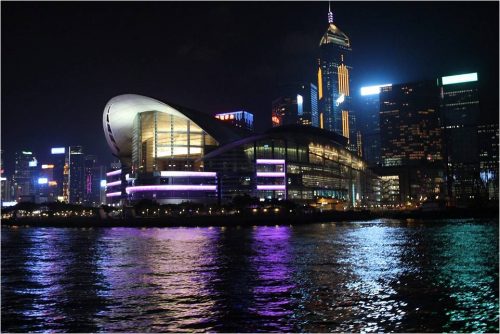Hong Kong’s financial services sector is likely to need another 5 million square feet of office space over the next 10 years, says a new report.
Hong Kong’s financial services sector is expanding, even in these uncertain times, according to a white paper from the global real estate giant Jones Lang LaSalle (JLL).
 Hong Kong has the most expensive office space in the world. This night view of the Central district and Victoria Harbour shows the Central Plaza, one of Hong Kong’s tallest buildings. Image: pixabay
Hong Kong has the most expensive office space in the world. This night view of the Central district and Victoria Harbour shows the Central Plaza, one of Hong Kong’s tallest buildings. Image: pixabay
Hong Kong – which since 1997 has been a “special administrative region” of China – has a free market economy and is highly dependent on international trade and finance. It ranks as Forbes’ 11th best country in the world for business.
During the past decade, as the region’s manufacturing industry has moved to the mainland, Hong Kong’s services industry has seen rapid growth. It has also established itself as the number one stock market for Chinese firms seeking to list abroad.
Hong Kong’s financial services sector is now the second largest contributor to the region’s GDP, which amounted to some 309.93 billion US dollars in 2015.
JLL suggest that while the larger Western banks are reducing their footprint in Hong Kong, this is being largely offset by growth in mainland China’s financial institutions.
The extra 5 million square feet of office space is equivalent to five skyscrapers like Central Plaza, one of Hong Kong’s tallest buildings.
Main drivers of demand
JLL envisage that the main drivers of demand for office space for Hong Kong’s financial services sector will be:
Growth of mainland financial institutions – this is likely to add 55,000 jobs over the next 10 years.
Funds management – banks offering funds management services, including asset management, private banking, and funds advisory services.
Financial technology (FinTech) – while still only a small part of the sector compared to other financial cities around the world, there is huge potential for this to grow in Hong Kong, say JLL, especially considering Hong Kong’s reputation for innovation and the proximity of China’s massive e-commerce market.
Insurance industry – mainland visitors purchasing insurance policies in Hong Kong are growing in number. In 2015, they spent 4.1 billion US dollars on insurance policies – a 400 percent growth since 2011.
The report suggests that over the next decade these various factors will change the profile of office space in Hong Kong, which has the most expensive office space in the world.
As Western banks move out, Chinese mainland firms move in
Traditionally, Hong Kong’s financial services sector firms have concentrated their offices in the Central business district. In 2015, financial services companies occupied about half the Grade A office space in the district.
But for various reasons – such as cost, building quality, and accessibility – a number of the larger banks have gradually relocated some operations outside of Central.
Also, as more mainland Chinese banks begin to occupy offices in Central, this is likely to trigger more larger American and European banks to move out of the district, say JLL.
Alex Barnes, JLL’s Head of Hong Kong Markets says:
“As larger Western financial institutions move out or reduce their footprints in Central, much of the vacated space will likely be backfilled by mainland Chinese corporates.”
